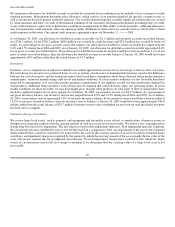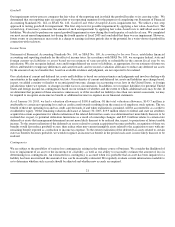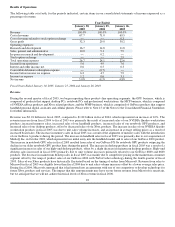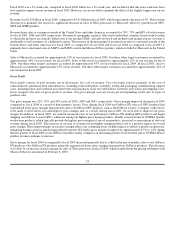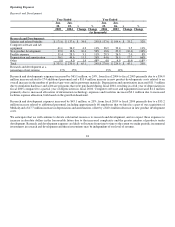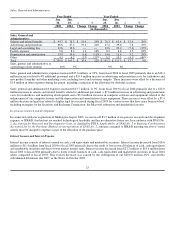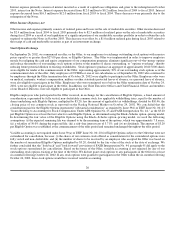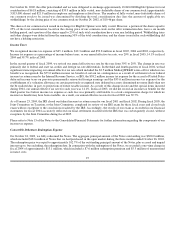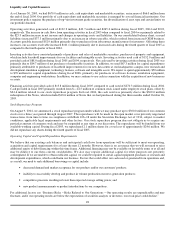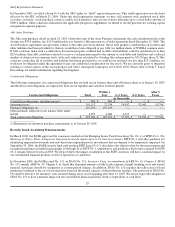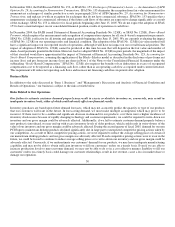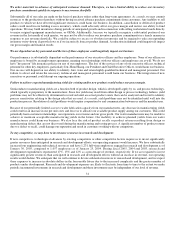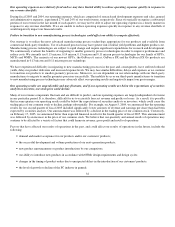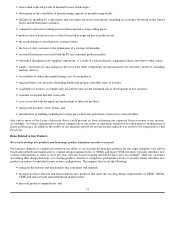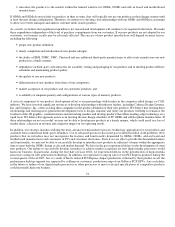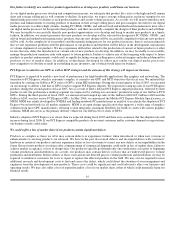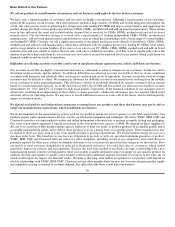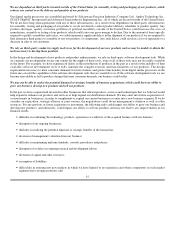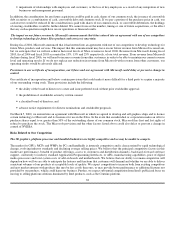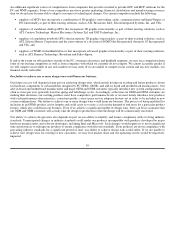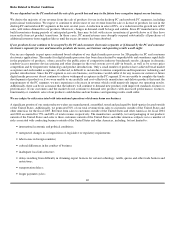NVIDIA 2005 Annual Report Download - page 36
Download and view the complete annual report
Please find page 36 of the 2005 NVIDIA annual report below. You can navigate through the pages in the report by either clicking on the pages listed below, or by using the keyword search tool below to find specific information within the annual report.
In December 2004, the FASB issued SFAS No. 153, or SFAS No. 153, Exchanges of Nonmonetary Assets −− An Amendment of APB
Opinion No. 29, Accounting for Nonmonetary Transactions. SFAS No. 153 eliminates the exception from fair value measurement for
nonmonetary exchanges of similar productive assets in paragraph 21(b) of APB Opinion No. 29, Accounting for Nonmonetary
Transactions, and replaces it with an exception for exchanges that do not have commercial substance. SFAS No. 153 specifies that a
nonmonetary exchange has commercial substance if the future cash flows of the entity are expected to change significantly as a result
of the exchange. SFAS No. 153 is effective for fiscal periods beginning after June 15, 2005. We do not expect the adoption of SFAS
153 to have a material impact on our consolidated financial position, results of operations or cash flows.
In December 2004, the FASB issued Statement of Financial Accounting Standards No. 123(R), or SFAS No. 123(R), Share−Based
Payment, which requires the measurement and recognition of compensation expense for all stock−based compensation payments.
SFAS No. 123(R) is effective for all interim and annual periods beginning after June 15, 2005. We are currently evaluating the impact
of SFAS No. 123(R) on our operating results and financial condition. The adoption of the SFAS No. 123(R) fair value method will
have a significant impact on our reported results of operations, although it will have no impact on our overall financial position. The
impact of adoption of SFAS No. 123(R) cannot be predicted at this time because that will depend on the fair value and number of
share−based payments granted in the future. However, had we adopted SFAS No. 123(R) in prior periods, the magnitude of the impact
of that standard would have approximated the impact of Statement of Financial Accounting Standards No. 123, Accounting for
Stock−Based Compensation, assuming the application of the Black−Scholes model as described in the disclosure of pro forma net
income (loss) and pro forma net income (loss) per share in Note 1 of the Notes to the Consolidated Financial Statements under the
subheading “Stock−Based Compensation.” SFAS No. 123(R) also requires the benefits of tax deductions in excess of recognized
compensation cost to be reported as a financing cash flow, rather than as an operating cash flow as required under current literature.
This requirement will reduce net operating cash flows and increase net financing cash flows in periods after adoption.
Business Risks
In addition to the risks discussed in “Item 1. Business” and "Management's Discussion and Analysis of Financial Condition and
Results of Operations," our business is subject to the risks set forth below.
Risks Related to Our Operations
Our failure to estimate customer demand properly may result in excess or obsolete inventory or, conversely, may result in
inadequate inventory levels, either of which could adversely affect our financial results.
Inventory purchases are based upon future demand forecasts, which may not accurately predict the quantity or type of our products
that our customers will want in the future. In forecasting demand, we must make multiple assumptions which may prove to be
incorrect. If there were to be a sudden and significant decrease in demand for our products, or if there were a higher incidence of
inventory obsolescence because of rapidly changing technology and customer requirements, we could be required to write−down our
inventory and our gross margin could be adversely affected. Additionally, if we fail to estimate customer demand properly before a
new product is introduced, we may end up with excess inventory levels of older products, which could result in write−downs of the
value of our inventory and our gross margin could be adversely affected. During the second quarter of fiscal 2005, demand for our non
PCI Express mainstream desktop products declined significantly due in large part to unexpected competitive pricing actions taken by
our competition. As a result of these competitive pricing actions, we were required to reduce the average selling prices of certain of
our mainstream desktop products and our gross margin was adversely affected. If such competitive pricing actions were to recur in the
future, we could be forced to continue to reduce average selling prices or to write−down our inventory and our gross margin could be
adversely affected. Conversely, if we underestimate our customers' demand for our products, we may have inadequate manufacturing
capability and may not be able to obtain sufficient inventory to fill our customers' orders on a timely basis. Even if we are able to
increase production levels to meet customer demand, we may not be able to do so in a cost effective manner. Inability to fill our
customers' orders on a timely basis could damage our customer relationships, result in lost revenue, cause a loss in market share or
damage our reputation.
30


